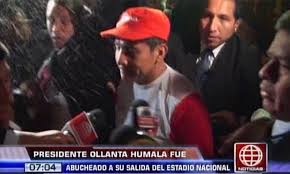
This week, according to the XXXIII Encuesta de Poder, the majority of respondents consider President Ollanta Humala to be the most powerful person in Peru. Realized annually by the consulting firm Ipsos Apoyo, this survey is not a public opinion poll, but instead is based on the perceptions of a select group of elites and opinion leaders, who are assumed to know a lot about power. This year 236 people responded, including government officials, politicians, intellectuals, journalists and businessmen.
For the last 33 years the President has been#1 in this survey, as befits his constitutional role as Chief of State and personification of the Nation. While this power is transitory, being an elected office, former presidents and eternal candidates also remain in the Top 10, along with important Cabinet ministers, bankers, the Archbishop of Lima, and Mario Vargas Llosa. On two occasions there have also been technical ties between the President and the person in the #2 spot; in 1997 it was national security advisor Vladimiro Montecinos, considered the evil power behind the throne of Alberto Fujimori, and last year it was First Lady Nadine Heredia, co-founder of the ruling party and a key advisor to her husband. This year, however, the analysts at Apoyo depict Humala as being very alone on the throne.
Both the solitude and fragility of presidential power were illustrated by a dramatic incident on Friday night. In the midst of a painful 2 -1 defeat by the national soccer team against Uruguay, in which Peru lost hopes for going to the 2014 World Cup, President Humala tried to leave the National Stadium quietly, alone and on foot. But enraged fans prevented him from doing so, raining bottles, insults and worse from the stands, shouting “salado” (meaning “jinxed” or bringing bad luck), and blocking his way out. Security guards struggled for some time before Humala was finally able to get to his car and drive off.

Besides the obvious questions about presidential security, some wonder if this incident reveals more fundamental problems of authority, representation, even national identity. As Aldo Panfichi recently wrote, these are all very weak in Peru, and the irrational, love-hate relationship between fans and the national team reflects this. And this time, when the team played badly, millions of disappointed citizens and soccer fans – including one jailed ex-president — didn´t blame just the players, the coach, or the referee – they blamed the most powerful guy in the room.

